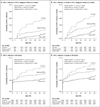Maternal or infant antiretroviral drugs to reduce HIV-1 transmission
- PMID: 20554982
- PMCID: PMC3440865
- DOI: 10.1056/NEJMoa0911486
Maternal or infant antiretroviral drugs to reduce HIV-1 transmission
Abstract
Background: We evaluated the efficacy of a maternal triple-drug antiretroviral regimen or infant nevirapine prophylaxis for 28 weeks during breast-feeding to reduce postnatal transmission of human immunodeficiency virus type 1 (HIV-1) in Malawi.
Methods: We randomly assigned 2369 HIV-1-positive, breast-feeding mothers with a CD4+ lymphocyte count of at least 250 cells per cubic millimeter and their infants to receive a maternal antiretroviral regimen, infant nevirapine, or no extended postnatal antiretroviral regimen (control group). All mothers and infants received perinatal prophylaxis with single-dose nevirapine and 1 week of zidovudine plus lamivudine. We used the Kaplan-Meier method to estimate the cumulative risk of HIV-1 transmission or death by 28 weeks among infants who were HIV-1-negative 2 weeks after birth. Rates were compared with the use of the log-rank test.
Results: Among mother-infant pairs, 5.0% of infants were HIV-1-positive at 2 weeks of life. The estimated risk of HIV-1 transmission between 2 and 28 weeks was higher in the control group (5.7%) than in either the maternal-regimen group (2.9%, P=0.009) or the infant-regimen group (1.7%, P<0.001). The estimated risk of infant HIV-1 infection or death between 2 and 28 weeks was 7.0% in the control group, 4.1% in the maternal-regimen group (P=0.02), and 2.6% in the infant-regimen group (P<0.001). The proportion of women with neutropenia was higher among those receiving the antiretroviral regimen (6.2%) than among those in either the nevirapine group (2.6%) or the control group (2.3%). Among infants receiving nevirapine, 1.9% had a hypersensitivity reaction.
Conclusions: The use of either a maternal antiretroviral regimen or infant nevirapine for 28 weeks was effective in reducing HIV-1 transmission during breast-feeding. (ClinicalTrials.gov number, NCT00164736.)
2010 Massachusetts Medical Society
Conflict of interest statement
No other potential conflict of interest relevant to this article was reported. Disclosure forms provided by the authors are available with the full text of this article at NEJM.org.
Figures


Comment in
-
Protecting the next generation--eliminating perinatal HIV-1 infection.N Engl J Med. 2010 Jun 17;362(24):2316-8. doi: 10.1056/NEJMe1004406. N Engl J Med. 2010. PMID: 20554987 No abstract available.
-
Maternal or infant antiretroviral drugs to reduce HIV-1 transmission.N Engl J Med. 2010 Nov 11;363(20):1969-70; author reply 1970. doi: 10.1056/NEJMc1009231. N Engl J Med. 2010. PMID: 21067394 No abstract available.
-
Maternal or infant antiretroviral drugs to reduce HIV-1 transmission.N Engl J Med. 2010 Nov 11;363(20):1969; author reply 1970. doi: 10.1056/NEJMc1009231. N Engl J Med. 2010. PMID: 21067395 No abstract available.
-
Maternal or infant antiretroviral drugs to reduce HIV-1 transmission.N Engl J Med. 2010 Nov 11;363(20):1968-9; author reply 1970. doi: 10.1056/NEJMc1009231. N Engl J Med. 2010. PMID: 21067396 No abstract available.
References
-
- Geneva: World Health Organization; 2007. HIV transmission through breastfeeding: a review of available evidence.
-
- Geneva: Joint United Nations Programme on HIV/AIDS; 2007. AIDS epidemic update.
-
- Newell ML, Coovadia H, Cortina-Borja M, Rollins N, Gaillard P, Dabis F. Mortality of infected and uninfected infants born to HIV-infected mothers in Africa: a pooled analysis. Lancet. 2004;364:1236–1243. - PubMed
-
- Thior I, Lockman S, Smeaton LM, et al. Breastfeeding plus infant zidovudine prophylaxis for 6 months vs formula feeding plus infant zidovudine for 1 month to reduce mother-to-child HIV transmission in Botswana: a randomized trial: the Mashi Study. JAMA. 2006;296:794–805. - PubMed
-
- WHO Collaborative Study Team on the Role of Breastfeeding on the Prevention of Infant Mortality. Effect of breastfeeding on infant and child mortality due to infectious diseases in less developed countries: a pooled analysis. Lancet. 2000;355:451–455. - PubMed
Publication types
MeSH terms
Substances
Associated data
Grants and funding
LinkOut - more resources
Full Text Sources
Other Literature Sources
Medical
Research Materials
